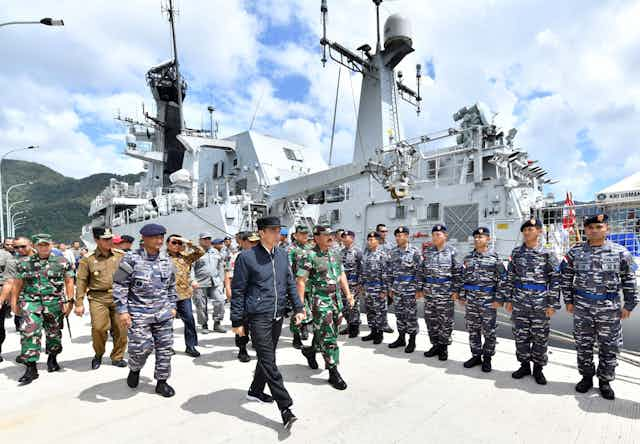Indonesia has been sending mixed signals in responding to China’s breach of its exclusive economic zone around the Natuna Islands, near the South China Sea.
The Natuna sea is within 200 nautical miles (370 kilometres) of Indonesia’s coastline, making it part of Indonesia’s Exclusive Economic Zone (EEZ).
Since December 19, 2019, Chinese fishing vessels have trespassed into the waters around the Natuna Islands, violating Indonesia’s sovereignty as regulated by the 1982’s United Nations Convention on the Law of the Sea.
Despite telling China to back out of its waters by deploying four warships and bolstering its air-force presence in the disputed area, Indonesia has also downplayed the issue.
Indonesia’s defence minister Prabowo Subianto had a relaxed response to China’s breach saying “China is a friendly nation”. Coordinating maritime affairs and investment minister Luhut Pandjaitan echoed Prabowo, saying Indonesia and China should not quarrel “over something that does not need to be an issue”.
This is not the first time China entered Indonesia’s territory around the Natuna Islands. Back in 2016, Indonesia also had to ratchet up defence around the islands after an incursion of Chinese fishing armada and coast guard vessels into its EEZ.
Presiden Joko “Jokowi” Widodo even made the point of defending Indonesia’s rights by having a cabinet meeting aboard a warship.
During the meeting, he ordered the Indonesian navy to step up patrols and improve the capabilities of the Indonesian military.
While China decided to stand down in 2016, the problem never completely disappeared.
Since the last standoff, Indonesia has been increasing its defence, but not to the extent that it has deterred China from causing problems.
To understand this, we have to look into the Indonesian military’s strategic culture.
Indonesia’s military culture
In a recent article in the journal Asian Politics & Policy, I wrote that Indonesia’s decision to neither strengthen its power significantly nor build a coalition to address China’s growing power in the South China Sea is driven by a military culture of focusing on domestic threats.
Since the late 1950s, the Indonesian military has been wary of what they perceived to be foreign-sponsored plots to destroy Indonesia internally.
In 1958, the military dealt with US-sponsored rebel movements called PRRI/Permesta. They are rebellious movements to overthrow the central government.
Then, between the 1950s and ‘60s it faced other domestic political challenges, notably from the Indonesian Communist Party.
Things came to a head on the evening of September 30, 1965, when six of the top army generals were murdered in what the government called a Communist-inspired coup. The army reacted violently by killing and imprisoning hundreds of thousands of Communist Party cadres, supporters, and sympathisers.
Since then, the military has believed any threat to Indonesia will come internally through groups who secretly support and help the enemies of the country, instead of from external direct military invasion.
Thus, Indonesia’s 2015 defense white paper warned of rising internal conflicts based on social, cultural, primordial, ethnic, race and religious dynamics. The military believes these could trigger secession movements such as the Arab Spring and civil wars in Iraq, Afghanistan, Libya and Syria.
Such a military culture has distorted Indonesia’s perception of threats. This has resulted in Indonesia spending more money on its army than both the navy and air force combined, even though a strong air and naval force would be far more effective in deterring threats from outside states.
Indonesia has also only spent a measly US$ 7.6 billion on its military in 2018. In contrast, China spent $239 billion.
So, in numbers, getting into a war with China is also unrealistic for Indonesia.
Domestic economic growth priorities
Since Indonesia believes its gravest threat comes from inside, internal stability is a priority for both its military and policymakers.
To maintain internal stability, the Indonesian government believes it needs to focus on economic growth and to deal with foreign-influenced domestic threats.
In the 1960s, under the Suharto government, Indonesia decided to push for high economic growth as it believed that political stability and economic development go hand-in-hand. Growing the economy was also a way for Suharto to legitimise his authoritarian rule.
Suharto’s successors, including Jokowi, also put emphasis on economic growth.
China is currently one of Indonesia’s main sources of investment.
In 2017, both China and Hong Kong invested $5.5 billion in Indonesia, slightly above Japan’s $5 billion. Not surprisingly, Jokowi is wary of invoking China’s wrath lest it will prevent them from getting Chinese investment and access to the Chinese market.
Chinese investment was desperately needed to revive Indonesia’s economy, which is expected to remain sluggish next year due to weakening exports, commodity prices and global uncertainties.
Indonesia’s economic interests in China explains why Jokowi’s aggressive reaction towards China in the 2016 Natuna sea dispute was only short-lived. With so many domestic issues, aggressive foreign policy, let alone challenging China, was not an option.
The way ahead
Indonesia should keep pushing for a peaceful diplomatic solution to this dispute. This includes bringing other players into the scene, such as what Jokowi is currently trying to do by inviting Japan to invest in Natuna Sea, thus forcing China to rethink its strategy.
But it is high time for Indonesia to start rethinking its military doctrine and pay more attention to strengthening its navy and air force, especially in light of growing tensions in the South China Sea.
Of course, the problem is that it is politically expensive and risky. It may also cause domestic disturbances due to changes in military structure and reactions from opposition groups.
But considering the international threats that may arise in the future, especially with the United States reducing its commitments all over the world, Indonesia, and the region as a whole, needs to rethink its assumptions of China.


